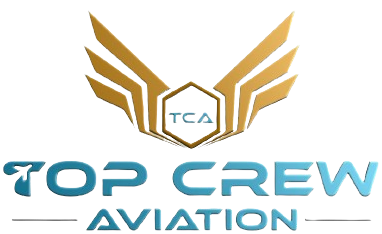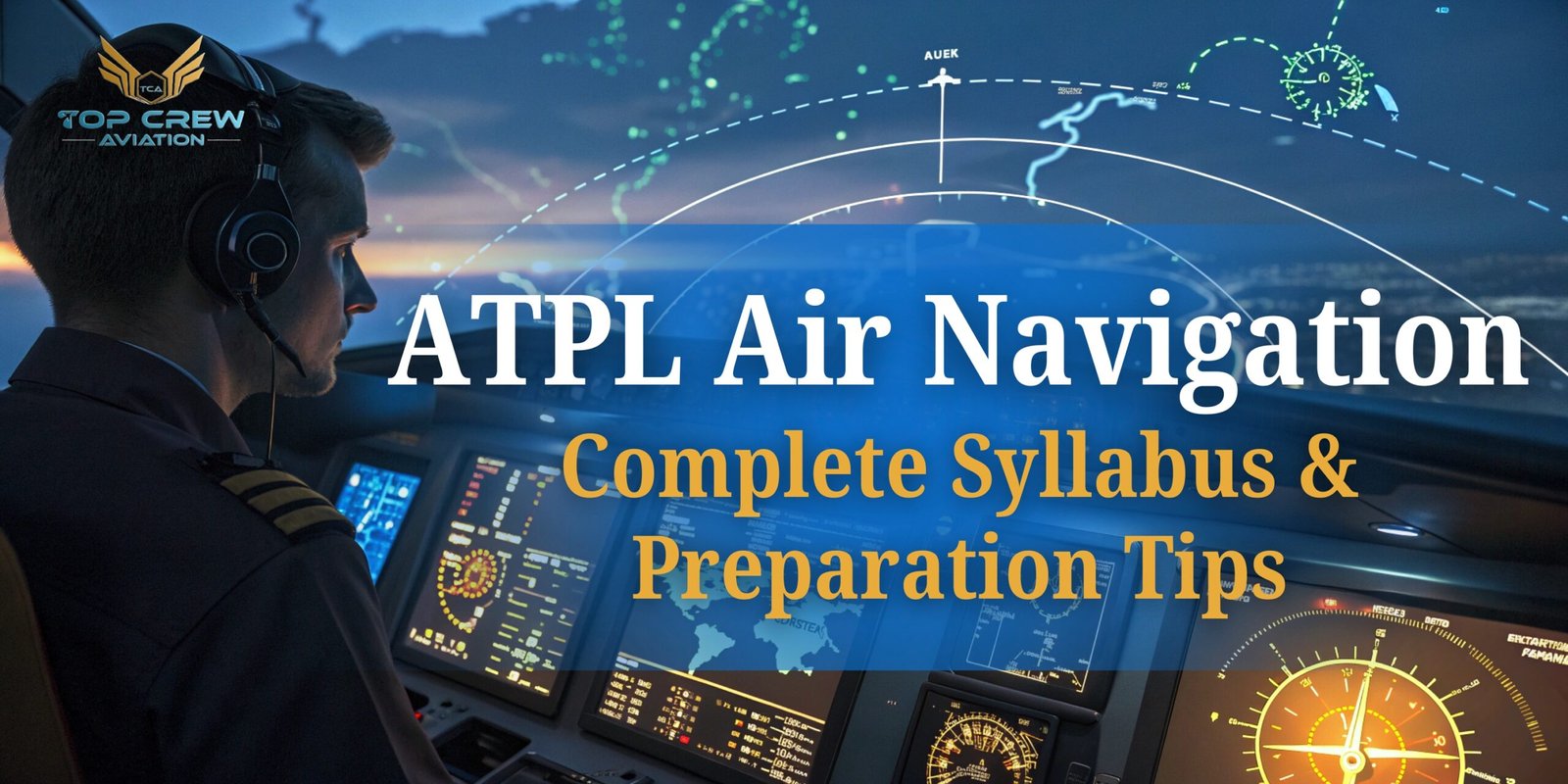Introduction
Becoming an airline captain is the ultimate dream of many aspiring pilots. To achieve this goal, clearing the ATPL (Airline Transport Pilot License) exams is a must. Among all ATPL subjects, ATPL Air Navigation is considered one of the toughest yet most important papers.
This subject is not only about passing an exam, but also about learning how to plan, monitor, and execute safe flights in real life. From time calculations to advanced radio navigation systems, ATPL Air Navigation covers everything a pilot needs to operate commercial flights at a global level.
In this blog, we will cover the complete ATPL Air Navigation syllabus (DGCA updated), exam pattern, age limit, training fees, preparation tips, challenges, and best study help. If you are preparing for your ATPL exams in India, this guide will give you all the information you need.
What is ATPL Air Navigation?
ATPL Air Navigation is one of the most important subjects in the DGCA Airline Transport Pilot License exams. It provides future airline captains with the knowledge and skills required to navigate aircraft across domestic and international routes.
Through this subject, pilots learn how to:
- Plan long-haul international flights with accuracy and efficiency
- Calculate and manage fuel requirements for safe and economical operations.
- Read and interpret navigation charts and instruments.
- Operate modern radio navigation systems such as VOR, DME, ILS, and GPS
- Apply advanced navigation concepts like ETOPS, alternate aerodrome planning, and in-flight monitoring.
In simple terms, ATPL Air Navigation ensures that airline pilots are capable of flying safely, economically, and efficiently under all conditions—whether on short domestic routes or complex long-haul international operations.
ATPL Air Navigation Age Limit & Eligibility
Before beginning your ATPL Air Navigation preparation, it is important to understand the eligibility criteria and age requirements set by DGCA:
- Minimum Age: You must be at least 21 years old to apply for an ATPL in India.
- Maximum Age: There is no fixed upper age limit, but you must be medically fit as per DGCA standards.
- Educational Qualification: Candidates should have passed 10+2 with Physics and Mathematics.
- License Requirement: A valid Commercial Pilot License (CPL) with the needed flying hours as per DGCA rules is mandatory.
In short, once you have cleared your CPL and completed the required flying hours, you are eligible to start preparing for ATPL Air Navigation. Meeting these criteria indicates that you are fully prepared to tackle one of the most critical subjects in the ATPL exam and progress toward becoming a professional airline captain.
ATPL Air Navigation Syllabus (DGCA Updated)
The DGCA-approved syllabus for ATPL Air Navigation is comprehensive and designed to prepare pilots for safe and efficient flight operations. It is divided into three main parts:
1. General Navigation
This section focuses on the fundamental principles of navigation:
- Understanding the Earth, Solar System, and Time zones (GMT, UTC, IST, LMT)
- Latitude, Longitude, Great Circle, and Rhumb Line calculations
- Reading and interpreting navigation charts and projections
- Magnetism, compasses, and magnetic variation
- Familiarity with key flight instruments such as the Altimeter, Airspeed Indicator, and Heading Indicator
2. Radio Navigation
Radio navigation forms a core part of ATPL Air Navigation and includes:
- NDB (Non-Directional Beacon) operations
- VOR (Very High Frequency Omni Range) navigation
- DME (Distance Measuring Equipment) usage
- ILS (Instrument Landing System) procedures
- GPS and GNSS (Global Navigation Satellite Systems)
- RNAV (Area Navigation) and RNP (Required Navigation Performance) systems
- Radar and surveillance systems for situational awareness
- Understanding errors, limitations, and the reliability of navigation aids
3. Flight Planning & Monitoring
This section teaches practical flight planning skills, including:
- Fuel calculation and endurance planning for different flight scenarios
- Weight and balance considerations for safe operations
- Planning for alternate aerodromes and ETOPS (Extended-range Twin-engine Operational Performance Standards)
- Maintaining accurate navigation logs and monitoring flights in real-time
The ATPL Air Navigation syllabus is detailed and requires not only theoretical understanding but also strong numerical and problem-solving skills. A systematic study approach and consistent practice are key to mastering this subject.
ATPL Air Navigation Exam Pattern & Marking Scheme
The DGCA ATPL Air Navigation exam is designed to test both theoretical knowledge and practical problem-solving skills. Here’s a detailed overview of the exam pattern:
- Question Type: The exam consists of Multiple Choice Questions (MCQs) along with numerical problems that require calculations and application of concepts.
- Exam Duration: Candidates are given 3 hours to complete the exam.
- Number of Questions: Approximately 100–120 questions are included in the paper.
- Passing Marks: A minimum of 70% is required to clear the exam.
- Negative Marking: Currently, there is no negative marking, but accuracy is crucial for scoring well.
Since the ATPL Air Navigation exam combines both theoretical concepts and numerical calculations, candidates must focus on concept clarity, formula accuracy, and speed. Regular practice of numerical problems and mock tests is essential to perform confidently on exam day.
ATPL Air Navigation Training Fees
Preparing for ATPL Air Navigation exams requires both time and financial investment. The overall cost depends on whether you choose self-study or enroll in a coaching institute. Here’s a detailed breakdown of the expenses in India:
- Self-Study with Books & Online Tests: ₹15,000 – ₹30,000
You can start with DGCA-approved books, guides, and online test series to practice theory and numerical problems.
- Ground School / Coaching Fees: ₹60,000 – ₹1,00,000
Joining a coaching institute or ground school provides structured learning, expert guidance, and regular mock tests. Fees may vary depending on the institute and course duration.
- Additional Costs: ₹10,000 – ₹20,000
This includes mock test series, DGCA exam fees, and printing/study material costs.
In total, the ATPL Air Navigation training fees in India generally range from ₹75,000 to ₹1,30,000. Investing in proper training and study material is crucial to ensure success in one of the most important subjects of the ATPL exams.
Preparation Tips for ATPL Air Navigation
Success in ATPL Air Navigation requires a combination of conceptual understanding, regular practice, and smart study strategies. Here are some effective preparation tips:
1. Understand the Basics First
Before diving into complex formulas and calculations, make sure you have a clear understanding of the basics. Start with:
- Time zones (GMT, UTC, IST)
- Navigation charts and projections
- Great circle and rhumb line calculations
Building a strong foundation will make advanced topics much easier to grasp.
2. Practice Numerical Questions Daily
ATPL Air Navigation involves heavy numerical calculations. Regular practice is essential for mastering:
- Fuel calculations and endurance planning
- ETOPS and alternate aerodrome planning
- Navigation log entries and conversions
Daily practice will improve both accuracy and speed.
3. Make a Formula Sheet
Maintain a separate notebook with all essential formulas, conversion tables, and short notes. Revise it every day to keep formulas fresh in your memory during exams.
4. Solve Mock Tests
Attempt DGCA-pattern mock tests regularly. Mock tests help you:
- Understand exam format
- Improve time management
- Identify weak areas that need more focus.
5. Manage Your Time Effectively
Divide the syllabus into smaller parts and set weekly targets. Allocate specific hours daily for theory, numericals, and revision to ensure complete coverage.
6. Use Standard Study Material
Stick to DGCA-approved books like Jeppesen and Oxford Aviation guides. Avoid using too many random sources, as it can create confusion and slow down preparation.
7. Stay Consistent and Focused
Preparing for ATPL Air Navigation usually takes 3–4 months of consistent effort. Make a study routine, follow it strictly, and revise regularly to achieve success.
Following these preparation tips will not only help you clear the ATPL Air Navigation exam but
also make you confident in handling real-life navigation challenges as a professional pilot.
Common Challenges in ATPL Air Navigation & How to Overcome Them
Preparing for ATPL Air Navigation can be demanding due to its vast syllabus and calculation-heavy content. Here are the most common challenges students face and practical solutions to overcome them:
1. Complex Numerical Problems
Many questions in ATPL Air Navigation involve multiple calculations, which can be time-consuming.
Solution: Practice numerical problems daily with a stopwatch to improve speed and accuracy. Learn shortcut methods for common calculations like fuel planning and time conversions.
2. Confusion Between GMT, UTC, and IST
Time zones are a critical part of Air Navigation, and mixing them up can lead to errors.
Solution: Create clear comparison charts and revise them regularly. Visual aids make it easier to remember the differences and conversions.
3. Difficulty in Remembering Formulas
The subject requires memorization of numerous formulas for navigation, fuel calculations, and instrument readings.
Solution: Use flashcards for quick revision and maintain a formula notebook. Daily revision ensures formulas stay fresh in your memory.
4. Vast Theory Portion
The theory part of ATPL Air Navigation can feel overwhelming due to the sheer volume of topics.
Solution: Break the syllabus into smaller sections. Use mind maps, diagrams, and
Summary notes simplify and retain information efficiently.
By identifying these challenges early and following structured strategies, students can make ATPL Air Navigation preparation more manageable and increase their chances of clearing the exam with confidence.
Recommended Books & Resources for ATPL Air Navigation
To excel in ATPL Air Navigation, using the right study material is crucial. Here are some highly recommended resources:
- Oxford Aviation ATPL Air Navigation – Comprehensive coverage of theory and practical problems.
- Jeppesen Air Navigation Book – Focuses on real-world navigation techniques and examples.
- Captain Shekhar Gupta’s DGCA Notes – Simplified notes tailored for DGCA exams.
- ICAO Documents – Official guidelines and standards for international flight operations.
- Online ATPL Test Series (DGCA Pattern) – Helps practice exam-style questions and improve speed and accuracy.
These resources provide everything you need to master ATPL Air Navigation and build confidence for both the exam and real-life navigation scenarios.
Role of Coaching / Ground School for ATPL Air Navigation
While self-study is possible, enrolling in ATPL Air Navigation coaching can significantly enhance your preparation and increase your chances of success. Coaching provides:
- Shortcut methods for complex numericals to save time during exams
- Guidance from experienced instructors with airline backgrounds
- Regular mock exams and doubt-solving sessions for practice and clarity
- Structured study plans to cover the entire syllabus efficiently.
With professional coaching, students can systematically approach ATPL Air Navigation, ensuring thorough preparation and higher confidence levels during the exam.
How Top Crew Aviation Can Help with ATPL Air Navigation
Top Crew Aviation is one of India’s leading pilot training academies, offering comprehensive support for students preparing for ATPL Air Navigation. Here’s how they can help you succeed:
- DGCA-Approved Study Material and Notes – Access to structured and exam-focused study resources.
- Experienced Instructors with Airline Backgrounds – Learn from professionals who bring real-world aviation experience.
- Mock Tests and Exam-Focused Training – Regular practice to improve speed, accuracy, and confidence.
- Guidance for Exam Application and Documentation – Complete support in handling DGCA paperwork and exam registrations.
- Flexible Batches and Online/Offline Classes – Options to suit your schedule and learning preferences.
With expert guidance from Top Crew Aviation, students can efficiently prepare for ATPL Air Navigation and have a higher chance of clearing the exam on their first attempt.
Conclusion
ATPL Air Navigation is a challenging subject, but with the right preparation strategy, consistent practice, and proper guidance, you can clear it successfully. Focus on building strong basics, practice numericals daily, and use standard books for preparation.
If you are serious about becoming an airline captain, mastering ATPL Air Navigation is a key milestone in your journey. Start early, stay consistent, and you will surely achieve your aviation dreams.
Suggestion Blog URL:-
Step-by-Step Guide to Start ATPL Ground Classes in India
Why ATPL Ground Classes Are Crucial for Airline Captains
What Are ATPL Ground Classes? Complete Beginner’s Guide

